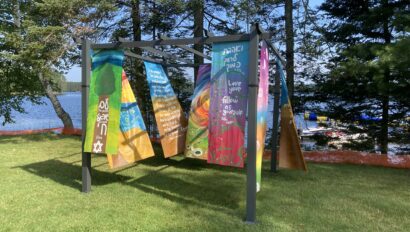Please enjoy a D’var Torah this week from Rosh Kochavim A and Rosh Halutzim 2019, Ellie Goldstein. Ellie has spent three summers at camp as a camper, two on staff, and one as a Rosh Aidah. Ellie is a first-year graduate student at the Columbia University Mailman School of Public Health, focusing on Population and Family Health.
Loving Kindness: Reflections on Parashat Chayei Sarah
by Ellie Goldstein
This week’s parashah, Chayei Sarah, begins with the death of Sarah (at the age of 127) and her burial in the Cave of Machpelah. However, this is not the focus of the parashah. The meat of the parashah is found in Abraham sending a servant, Eliezer, to find a wife for Isaac. The following verse describes the sign that Eliezer looks for to signal that a woman is right for Isaac:
וְהָיָ֣ה הַנַּֽעֲרָ֗ה אֲשֶׁ֨ר אֹמַ֤ר אֵלֶ֨יהָ֙ הַטִּי־נָ֤א כַדֵּךְ֙ וְאֶשְׁתֶּ֔ה וְאָֽמְרָ֣ה שְׁתֵ֔ה וְגַם־גְּמַלֶּ֖יךָ אַשְׁקֶ֑ה אֹתָ֤הּ הֹכַ֨חְתָּ֙ לְעַבְדְּךָ֣ לְיִצְחָ֔ק וּבָ֣הּ אֵדַ֔ע כִּֽי־עָשִׂ֥יתָ חֶ֖סֶד עִם־אֲדֹנִֽי
And it will be, [that] the maiden to whom I will say, ‘Lower your pitcher and I will drink,’ and she will say, ‘Drink, and I will also water your camels,’ her have You designated for Your servant, for Isaac, and through her may I know that You have performed loving kindness with my master.”
If the woman provides water to Eliezer and his camel, then she is right for Isaac. This reflects the importance that Eliezer places on loving kindness (gemilut hasadim) as a value that must be present in the woman fit to marry Isaac. Rebecca fills her pitcher at the well and, after Eliezer asks for a drink of water, she offers a drink to his camel too. Rebecca passes the test.
The term loving kindness stands out to me in this parashah. Rebecca did not offer water to the camel because she knew that marriage to Isaac was on the line. Instead, Rebecca anticipated the needs of those around her (the thirst of Eliezer and the camel) and acted on those needs. We can think of loving kindness as kindness with intention, a choice to better someone around us, even though we may not benefit.
The Halutzim theme this summer centered on the text below:
:הוּא הָיָה אוֹמֵר, אִם אֵין אֲנִי לִי, מִי לִי. וּכְשֶׁאֲנִי לְעַצְמִי, מָה אֲנִי. וְאִם לֹא עַכְשָׁיו, אֵימָתַי
“If I am not for myself, who will be for me? If I am only for myself, what am I? And if not now, when?”
This Pirkei Avot passage ties directly to the idea of loving kindness. The second sentence focuses on the traditional idea of picking up on the needs of those around us and directing our attention away from ourselves. The first sentence, however, focuses on a different interpretation of loving kindness – loving kindness towards ourselves. If we only focus on others, no one will look out for us. In practice, this means taking time for yourself or pushing yourself outside of your comfort zone. At camp, this could look like an individual walk around the Garbage Trail or reading Torah for the first time. The third sentence highlights the immediacy of these two ideas. There is no time to wait to engage in acts of kindness with intention, both for others and for ourselves.
What are ways that you can practice loving kindness (to yourself and others) on the Kikar this summer?






